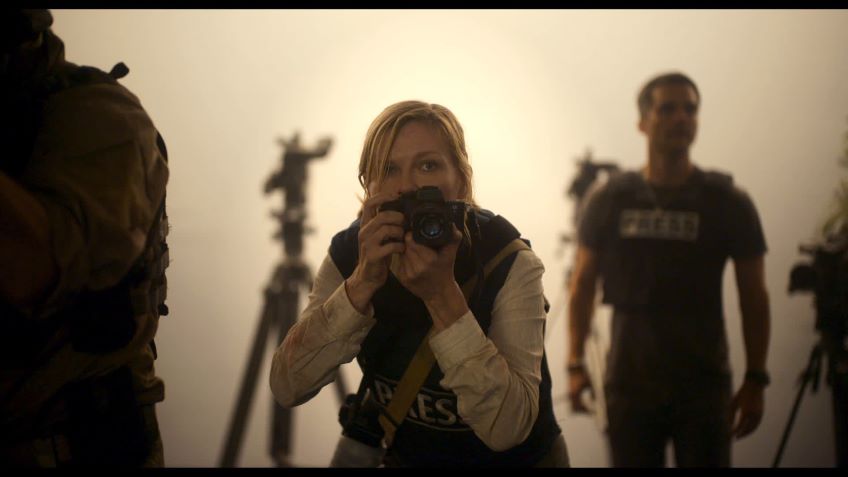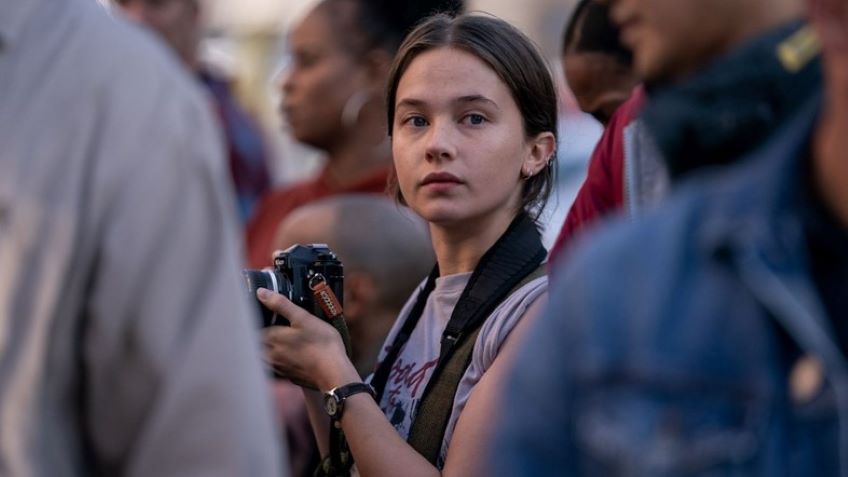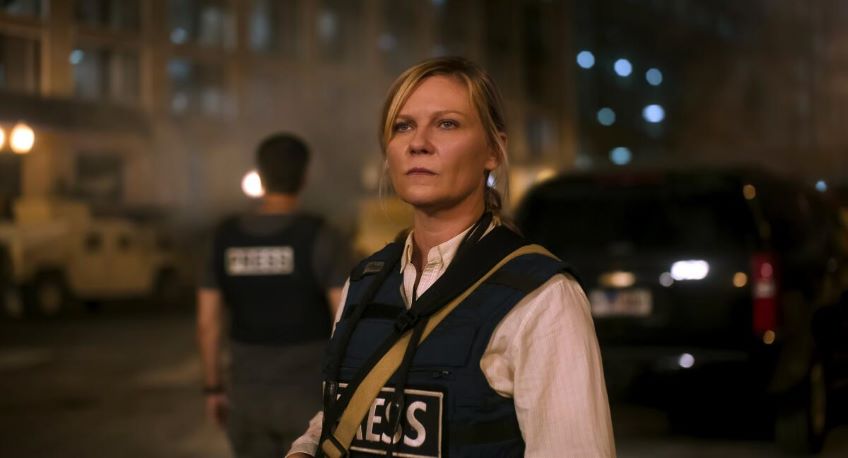Joyce Glasser reviews Civil War (April 12, 2024) Cert 15, 109 mins. In cinemas
Alex Garland is one of the UK’s most accomplished writer-directors, creating disturbing versions of a still-recognisable society in a dystopian future or parallel world. After writing the novel, The Beach, he wrote the script for Danny Boyle’s 28 Days Later, arguably the UK’s best dystopian and zombie movie of the millennium. Dystopian, too, was Never Let Me Go and Ex-Machina, the atmospheric, suspenseful Sci-Fi thriller that was his directorial debut.
Now Garland looks across the pond and imagines, with not that great of a leap of the imagination, a second civil war in the USA. Civil War’s power lies in Kirsten Dunst’s performance and in Garland’s ability to turn his well-executed blunt concept into a stark warning.
That said, the film is a cop out because it pretends to be apolitical, presumably not to alienate the very voters who might benefit from the warning or to avoid inciting a replica of the violence on the screen. And of course, the producers have nothing to gain from insulting or attacking the ticket buying public with any inconvenient truths. But the elephant in the room is that a civil war is very political and the dress rehearsal was January 6, 2021.

It’s the near future but a lot has changed in the USA. For one thing, the incumbent President (Nick Offerman) is on his third term in office when the Constitution, as it stands in 2024, stipulates a two-term limit. Perhaps the Civil War that has turned the USA into a dystopian wasteland is the result of this President flaunting the Constitution and giving himself a third term, and dictatorial powers, Putin style.
While Garland provides us with scant information about the nature of the civil war (anarchy seems to rule), we learn through news casts that there is a block called the Western Forces – which hilariously consist of liberal California and conservative Texas – a Florida Alliance, Loyalist States and a New People’s Army.
Although the war has created homeless hordes, families camping together in the ruins of sports facilities and armed loyalist soldiers, rebels and marauders controlling the roads, there still seems to be a Reuters news service. We know this as renowned war photojournalist Lee Smith (think Lee Miller or Marie Colvin) is holed up in a hotel with power shortages trying to file her story on a NYC suicide bombing.
In the chaos, Lee and her colleague Joel (Wagner Moura) are adopted by a cloying aspiring photojournalist named Jessie (Cailee Spaeny, Priscilla Presley in Priscilla). The audience recognises that this girl – who uses flattery (she tells Lee that she is her hero, her role model), vulnerability and daring in equal measure – is trouble. To be fair, the team do not encourage her, but Jessie has a way of getting what she wants. She manages to blag her way onto their van heading to Washington DC, where Lee aims to interview the President before the rebel troops attack. This is the interview that will be the crown in her celebrated career.
The team also agree to transport Sammy (Stephen McKinley Henderson), an ailing veteran journalist and Lee and Joel’s former mentor, to Charlottesville, Virginia where he hopes to bag a separate story, his swan song, for the New York Times.

Viewers will notice that we now have a nuclear family. Sammy, the wise gramps who people listen to too late, the experienced male/female breadwinners with the van and the kid with the camera intent on following in their footsteps. For the rest of the film, until the van arrives in the Washington area, this family goes on a road trip that is a succession of tense and/or violent encounters. The film looks and feels like John Hillcoat’s road movie, The Road, based on the dystopian novel by the late Cormac McCarthy, and a grander, costlier version of 28 Days Later.
In one episode, a rare car on the road seems to be following the van, creating suspense until Joel recognises the driver as an old colleague, Tony (Nelson Lee) and his Hong Kong reporter friend Bohai (Evan Lai). When Tony crawls out of Bohai’s car through the window to join Joel and Lee, an energised Jessie, trying to make an impression when she isn’t the centre of attention, does the same stunt in reverse, driving off with Bohai whose car soon disappears. The others risk their lives trying to save the pair from a burly Proud Boy-type soldier (Jessie Plemons).
Before the half way mark, there is no more filing of stories, no conversations with news agencies and little semblance that an infrastructure still exists to pay Lee and Joel, if not Sammy, a salary and expenses (no receipts are collected). And would the van or the newswire really be insured to carry Jessie across country? The real horror in Civil War is the “home” invasion orchestrated by this outsider, who turns out to be responsible for two deaths in the nuclear family and a few others.
Garland’s mistake is not to make the film about how Jessie, the self-obsessed infiltrator of this oedipal family, represents the future after the civil war. The three, honest, hard-working, generous journalists see Jessie as a minor hindrance whom they must protect. Right up to the devastating ending no one sees that she’s an opportunist with no sense of responsibility. Jessie is as dangerous in her recklessness and ambition as the gun toting racists the group encounter.




